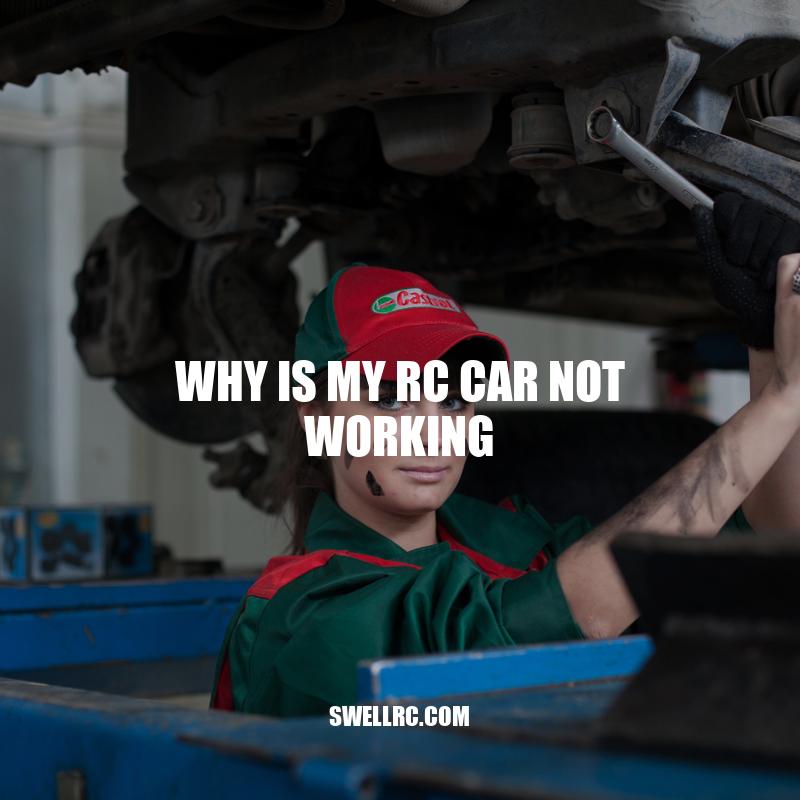Troubleshooting Guide: Why Your RC Car Is Not Working
RC cars are a popular hobby for people of all ages. The thrill of racing around a track or fine-tuning the components for maximum performance can provide hours of entertainment. However, even the most well-maintained RC car can encounter problems. When you experience issues such as a car not moving or responding, it can be frustrating and daunting to diagnose and resolve the problem. Identifying and troubleshooting issues with your RC car is an essential skill to have as it can save time, money, and the possibility of causing further damage to your vehicle. Regardless of whether you are a seasoned pro or new to the RC car world, understanding the components that make up your car and some common issues and solutions can help you get back on track and enjoying the hobby in no time. In this article, we’ll explore why your RC car might not be working and provide solutions for resolving common issues.
Understanding RC Car Components
When it comes to diagnosing and solving problems with your RC car, the first step is understanding its components. Here are the key parts of an RC car and how they work together:
Transmitter
The transmitter is the hand-held device you use to control your car remotely. It sends signals to the receiver, which then sends commands to the motor, speed controller, or servo.
Receiver
The receiver receives signals from the transmitter and interprets them to control the car’s speed, direction, and other functions.
Motor
The motor is the heart of the car and responsible for its movement. There are several types of motors, including brushed, brushless, and nitro.
Speed controller
The speed controller controls the speed of the motor and regulates the voltage to prevent overheating.
Battery
The battery provides power to the motor and other components. Common types of batteries include nickel-cadmium (NiCad) and lithium polymer (LiPo).
Tips for Checking Components
When experiencing issues with your RC car, consider checking these components to identify the problem:
- Check the battery to ensure it is charged and not damaged.
- Check the transmitter and receiver to ensure they are on the same frequency and within range of each other.
- Check the motor and speed controller for damage or overheating.
- Check the connections between components to ensure they are secure and not damaged.
If you are new to RC cars or experiencing complex issues, it may be helpful to consult the manufacturer guides or online forums for advice.
What are the basic components of an RC car?
RC cars, also known as remote control cars or radio control cars, are miniature vehicles that you can control with a remote. The basic components of an RC car include:
- Chassis and frame
- Motor and electronic speed controller
- Battery and charger
- Transmitter and receiver
- Tires and wheels
- Servo
Each of these components plays an important role in making an RC car functional and enjoyable to use. If you’re interested in purchasing an RC car, be sure to check out reputable websites like Amazon, HobbyKing, and Tower Hobbies for a variety of options.
Common RC Car Problems and Solutions
Even well-maintained RC cars can experience problems, but understanding the common issues and solutions can help get your car up and running again. Here are some common problems and ways to troubleshoot them:
Issue: Motor Failure
- Symptoms: Motor doesn’t start or runs inconsistently, Motor runs but lacks power
- Causes: Worn-out bearings, damaged rotor, dead battery, Motor winding issues, faulty speed controller
- Solutions: Replace worn-out bearings or rotor, replace battery, replace motor, replace speed controller
Issue: Dead Batteries
- Solutions:
- Testing the battery’s voltage levels.
- Troubleshooting possible culprits for battery drain.
- Battery replacement if battery charge hold is not consistent.
Issue: Connectivity Problems
- Solutions:
- Checking transmitter and receiver batteries and frequency.
- Inspecting antennae placement and fixing damage and distractions.
- Pairing your transmitter and receiver (may vary based on model).
Interesting fact:
Skill Level and Your RC Car
Novice drivers tend to put more stress on their RC cars over other drivers. A beginner driver may overheat batteries, drive so fast that it damages the transmission or spins out of control, and other things. On the other hand, intermediate and professional drivers may have different driving habits that would affect the wear and tear of their RC cars differently.
If you are still experiencing issues with your RC car, consider consulting online forums or reaching out to the manufacturer for support. There is also a range of RC car repair and parts websites that offer advice, tips, and assistance for a variety of common issues.
How do you diagnose RC car problems?
There are several ways to diagnose RC car problems, including:
- Checking the battery and charger to make sure they are functioning properly.
- Examining the motor and wiring to see if there are any loose connections or damage.
- Testing the receiver and transmitter to ensure they are communicating effectively.
- Inspecting the suspension, wheels and tires for any signs of wear or damage.
If you need further assistance, there are many websites and forums dedicated to RC car enthusiasts where you can ask for help and advice. Additionally, some RC car brands offer tech support and troubleshooting guides on their websites or product manuals.
Maintenance and Best Practices
Regular maintenance is key in ensuring RC cars continue to run smoothly, and implementing best practices can help prevent issues from occurring in the first place. Here are some tips to maintain and keep your RC car in good condition:
Tip 1: Keep It Clean
- Clean your car after every use to remove dirt, sand, and other debris that can damage the motor, tires, and other components.
- Use a soft brush or compressed air to clean hard-to-reach spots.
- Don’t use a direct stream of water as it can damage the electronics.
Tip 2: Check Screws and Bolts
- Check all screws and bolts for tightness before and after each use.
- Look for wear and tear and replace any that are damaged.
Tip 3: Store It Properly
- Store your car in a dry, cool place, away from direct sunlight or moisture.
- Remove the battery when not in use, and store it separately in a cool and dry location.
Websites and Products
There are plenty of online resources that can guide you through troubleshooting and maintaining your RC car, such as:
- RC Car Action Magazine – a popular resource for everything RC cars, featuring articles, product reviews, and tips for beginners and advanced users alike.
- HobbyPartz – an online retail store that offers a wide range of RC car parts and accessories at affordable prices.
- RC Planet – another popular online retailer, featuring a vast selection of RC car parts from industry-trusted brands.
By following these tips and resources, you can keep your RC car in top operating condition and prolong its lifespan.
How do you maintain an RC car?
Maintaining an RC car is crucial in ensuring its longevity and optimal performance. Here are some tips to keep your RC car in top shape:
- Regularly clean the car, especially after use.
- Inspect the car for any visible damage or wear and tear.
- Ensure that screws and bolts are tightened properly.
- Check the battery and charger regularly.
- Store the car in a cool and dry place when not in use.
Some useful resources for maintaining RC cars include the websites RC Driver and RC Car Action, as well as products like the Traxxas maintenance kit.
Call to Action
In conclusion, troubleshooting RC cars may not always be a straightforward process, but with patience and determination, most issues can be resolved. By understanding the components of your RC car and developing healthy maintenance habits, you can prevent future problems and ensure an extended lifespan for your vehicle.
It’s essential to stay up-to-date with the latest information and products in the RC car community. Numerous online resources offer tutorials, articles, reviews, and product updates that can help keep you informed and knowledgeable.
Don’t hesitate to reach out to local hobby shops or online communities for advice and support in troubleshooting your RC car issues. Some hobbies shops may offer services to help fix your car for a fee, while others may offer classes on maintenance and repair.
Remember, every problem has a solution, and with the right mindset and resources at your disposal, you can get your RC car back in working order in no time.
Ready to Start Troubleshooting?
If you’re eager to dive deeper into the world of RC cars and troubleshooting, check out our recommended resources and start exploring. As always, good luck, and happy racing!



